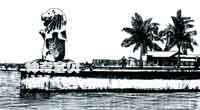Between the Malay Peninsula and Sumatra Island, there is a long and slender waterway that runs from southeast to northwest. Its northwest end is connected to the Andaman Sea, and its southeast end is connected to the South China Sea. This is the Strait of Malacca. The total length of the strait is about 1080 kilometers, the widest point in the northwest is 370 kilometers, and the narrowest point in the southeast is only 37 kilometers. The Strait of Malacca is named after the ancient city of Malacca along the coast. Malacca City was originally a small fishing village located on the southern coast of the Malay Peninsula. From the mid-15th century, it began to prosper, established the Kingdom of Mansaka, and unified the Malay Peninsula. By the beginning of the 16th century, the city of Malacca was already very prosperous, no less prosperous than the famous Mediterranean cities such as Venice, Alexandria and Genoa at that time.

Diagram of the Strait of Malacca
The Strait of Malacca is a chokepoint connecting the Pacific and Indian Oceans. It is an important sea passage for the coastal countries of Asia, Africa, Australia and Europe. The oil and strategic materials imported by many developed countries must be shipped out here.
The Strait is located in the equatorial windless zone, and there are many calm days throughout the year, which is conducive to navigation. The bottom of the strait is flat, mostly sandy, and the water flow is gentle and prone to siltation. There are shoals and sandbars under the water, and accidents of giant ships running aground often occur. Some people predict that due to rapid sedimentation on both sides of the Strait, the Malay Peninsula and Sumatra may be connected in 1,000 years, and the Malacca Strait may disappear from the earth.
Memories of the glorious past are thick. The Strait of Malacca has a long history. Around the 4th century AD, the Arabs opened a route from the Indian Ocean through the Strait of Malacca and through the South China Sea to China. They transported Chinese silk, porcelain, and spices from the Maluku Islands to Rome and other European countries. From the 7th to the 15th century AD, maritime trade ships from China, India and Arab countries all passed through the Strait of Malacca.
In the early 16th century, Portuguese navigators opened up a route from the Atlantic Ocean to the Indian Ocean. In 1869, the Suez Canal was completed, greatly shortening the shipping route from Europe to the East. The number of navigation ships in the Strait of Malacca has increased dramatically. In recent years, more than 80,000 ships have passed through the strait every year, making it one of the busiest straits in the world. The Port of Singapore along the coast is a world-famous port with the fourth largest throughput in the world. The dock shoreline in the port is three to four kilometers long and can accommodate more than 30 giant ships to berth at the same time. It has a 400,000-ton giant shipyard that can repair the world's largest supertanker.

The island of Singapore at the southern tip of the Malay Peninsula is shaped like a sitting lion. The sitting sculpture on the Singapore beach is the symbol of Singapore.
The Strait of Malacca is beautiful and rich along the coast. The annual average temperature is above 25°C, and the annual rainfall is about 3,000 mm. Tropical jungles cover both sides of the bank, and evergreen trees up to 60 meters high can be seen everywhere. Various vines and climbing plants are entangled between the giant trees like a dragnet. Both sides of the Taiwan Strait are important producing areas of tropical rubber, tin and oil. Penang Island in the northwest has beautiful scenery and is known as the "Pearl of the Orient".
The island of Singapore at the southern tip of the Malay Peninsula is shaped like a sitting lion, and people call it the "Lion City". Singapore is adjacent to the Strait to the south, which is the throat between the South China Sea, the Java Sea and the Strait of Malacca. The Republic of Singapore consists of 54 islands and 9 reefs. Surrounded by the ocean, the temperature is high but not hot, with dense woods, green grass, and a carefully landscaped environment that is managed in an orderly manner. It can be said that there is no bare ground and no flying dust. It is convincingly believed that this is a beautiful garden city. Therefore, in this land of more than 600 square kilometers, one to two million tourists come every year. Its first-class sanitation and first-class services have won praise from the world.
animal tags:
We created this article in conjunction with AI technology, then made sure it was fact-checked and edited by a Animals Top editor.